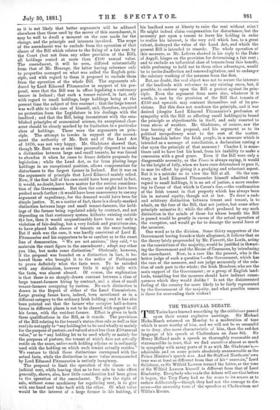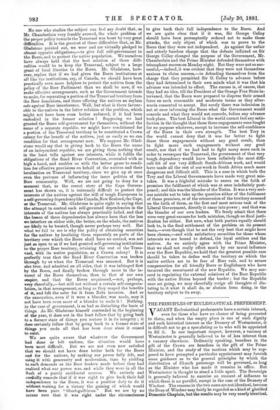THE TRANSVAAL DEBATE.
THE Tories have learned something by the criticisms passed upon their recent explosive meetings. Sir Michael Hicks-Beach returned on Monday to a moderation of tone which is more worthy of him, and we will not be so uncandid as to deny, also more characteristic of him, than the red-hot language of his speech at Cheltenham on June 8th. Sir Henry Holland made a speech so thoroughly reasonable and statesmanlike in tone, that we find ourselves almost as much in sympathy with many parts of it as with Mr. Gladstone's,— admirable and on some points absolutely unanswerable as the Prime Minister's speech was. And Sir Stafford Northcote' own tone was at least as different from that of his" suzerain," Lord Salisbury, as Sir Wilfrid Lawson termed the latter, as the tone of Sir Wilfrid Lawson himself is different from that of Lord Kimberley. Everybody who reads the debate will see thatbefore it began, the Tory Party had no far come to its senses as to eschew deliberately—though they had not the courage to dis- avow—the unworthy tone of the speeches at Cheltenham and Willis's Rooms. No one who studies the subject can feel any doubt that, as Mr. Chamberlain very frankly avowed, the whole problem of the proper policy towards the Transvaal was beset by very great difficulties. It is the greatest of these difficulties that, as Mr. Gladstone pointed out, we were and are virtually pledged to almost opposite obligations,—to give full self-government to the Boers, and to protect the native population. We ourselves have always held that the best solution of these diffi- culties would be to keep the Transvaal, subject to a large grant of local liberties to the Boers. Mr. Gladstone, how- ever, replies that if we had given the Boers institutions at all like the institutions, say, of Canada, we should have been practically even more helpless to protect the natives from the policy of the Boer Parliament than we shall be now, if we make effective arrangements, such as the Government intends to make, for separating a portion of the Transvaal territory from the Boer dominions, and there offering the natives an asylum safe against Boer interference. Well, but what is there favour- able to the natives in the latter solution of the problem, which might not have been even better enforced, if it had been embodied in the former solution ? Supposing we had granted the Boers self-government for themselves, without the name of a separate republic, we might have conditioned for a portion of the Transvaal territory to be constituted a Crown colony for the benefit of the natives, just as easily as we can condition for that arrangement now. We suppose Mr. Glad- stone would say that in giving back to the Boers the name of an independent republic, we are giving them nothing that in the least tells against our interests, while it fulfils the obligations of the Sand River Convention, overruled with so high a hand, and enables us with the better grace to condi- tion for effective provisions on behalf of the natives and their localisation on Transvaal territory, since we give up at once even the pretence of influencing the inner politics of the Boer community. Well, we are not going to deny for a moment that, as the recent story of the Cape Govern- ment has shown us, it is extermely difficult to protect the interests of the natives against the will of tough Europeans in a self-governing dependency like Canada, New Zealand, the Cape, or the Transvaal. Mr. Gladstone is quite right in saying that the attempt to control such self-governed dependencies in the interests of the natives has always practically failed, and that the lesson of. these dependencies has always been that the less we interfere on either side, the better, on the whole, the natives are likely to be treated, though never perhaps very well. But what we fail to see is why the policy of obtaining securities for the natives by localising them separately on parts of the territory over which the Boers shall have no control, was not just as open to us if we had granted self-governing institutions to the proper Boer territory, retaining the rest of the Trans- vaal, with its native population, as a Crown colony? It is perfectly true that the Sand River Convention was broken through by us when the Transvaal was annexed. But it is also true, and admitted on all sides, that it was infringed first by the Boers, and finally broken through more in the in- terest of the Boers themselves, than in that of our own empire, and that the Boers acquiesced,—not, perhaps, very cheerfully,—but still not without a certain self-congratu- lation, in that arrangement, so long as they reaped the benefits of it, and felt the safer for it from Zulu invasion. And as the annexation, even if it were a blunder, was made, may it not have been even more of a blunder to undo it ? Nothing, in the case of government, is so bad as disturbing the basis of things. As Mr. Gladstone himself contended in the beginning of the year, it does not in the least follow that by going back to a former state of things you restore it in its integrity ; it does certainly follow that by going back to a former state of things you undo all that has been done since it ceased to exist.
We are quite aware that whatever the Government had done or left undone, the situation would have been most difficult. But we are not even now satisfied that we should not have done better both for the Boers and for the natives, by making our power fully felt, and using it with generosity and moderation, than by yielding to such demands as the Boer leaders made before they had realised what our power was, and while they were in all the flush of a purely accidental success. We entirely and cordially concede that if it was right to give back their full independence to the Boers, it was a positive duty to do it- without waiting for a victory the gaining of which would have been pure " blood-guiltiness." But we are by no means sure that it was right under the circumstances
to give back their full independence to the Boers. And we are quite clear that if it was, Sir George Colley should have been peremptorily ordered not to make those attacks, the only object of which was to prove to the Boers that they were not independent. As against the unfair and utterly baseless charge that the• defeats inflicted on Sir George Colley changed the purpose of the Government, Mr. Chamberlain and the Prime Minister defended themselves with triumphant success on Monday night. But they were not so sue- cessful,—indeed, it was evident that they were not themselves anxious to claim success,—in defending themselves from the charge that they permitted Sir G. Colley to advance before they had determined in their own minds what it was that his advance was intended to effect. The excuse is, of course, that they had no idea, till the President of the Orange Free State in- tervened, that the Boers were prepared to disperse their armed force on such reasonable and moderate terms as they after- wards consented to accept. But surely there was indecision in not at once informing the Boers what the Government would concede and what they would not concede, before any advance took place. The best Liberal in the world cannot feel any satis- faction in the thought that these three engagements were fought for no purpose whatever, except to increase the self-confidence of the Boers in their own strength. The best Tory in the world cannot deny that it was far better to fight these three engagements without any good result, than to fight more such engagements without any good result, nor that if we had had to fight many more such in order to reconquer the Transvaal, the government of that very tough dependency would have been infinitely the most diffi- cult bit of our very difficult South-African work, and would have made all the rest of our work in South Africa much more dangerous and difficult still. This is a case in which both the Tory and the Liberal Governments have made very great mis- takes. It was a frightful mistake to annex on the faith of promises the fulfilment of which was at once indefinitely post- poned; and this was the blunder of the Tories. It was a very seri- ous mistake not to take up the question either of the fulfilment of those promises, or of the retrocession of the territory annexed on the faith of them, as the first and most serious task of the Liberal Government, directly it came into power ; and that was the blunder of our own leaders. We freely admit that there were very great excuses for both mistakes, though no final justi- fication for either. But now, what both parties equally should look to, is the final settlement of the problem on its present basis,—even though that be not the very best that might have been chosen,—and with satisfactory securities for those whose interests we are bound to defend, the loyal settlers and the natives. As we entirely agree with the Prime Minister, that we shall not really effect much by our moral influence over the Boer Republic, we hold that the greatest possible care should be taken to define well the territory on which the native settlers are to be free of Boer rule, and to secure compensation for all friendly Boers or Englishmen who have incurred the resentment of the new Republic. We may suc- ceed in regulating the external relations of the Boer Republic with the native States beyond the border ; but the Republic once set going, we may cheerfully resign all thoughts of dic- tating to it what it shall do, or abstain from doing, in the• territory subject to its sway.



































 Previous page
Previous page